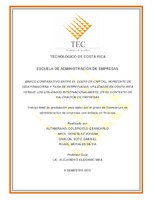Mostrar el registro sencillo del ítem
Marco comparativo entre el costo de capital, horizonte de vida financiera y tasa de perpetuidad utilizados en Costa Rica versus los utilizados internacionalmente, en el contexto de valoración de empresas
| dc.contributor.advisor | Alejandro Elizondo Castillo | es |
| dc.contributor.author | Arce-González, Johana | |
| dc.contributor.author | Altamirano-Colepicolo, Geancarlo | |
| dc.contributor.author | Chacón-Soto, Gabriel | |
| dc.contributor.author | Rojas-Morales, Silvia | |
| dc.date.accessioned | 2019-11-07T17:38:08Z | |
| dc.date.available | 2019-11-07T17:38:08Z | |
| dc.date.issued | 2010 | |
| dc.identifier.uri | https://hdl.handle.net/2238/11011 | |
| dc.description | Proyecto de graduación (Bachillerato Administración de Empresas) Instituto Tecnológico de Costa Rica, Escuela de Administración de Empresas, 2010. | es |
| dc.description.abstract | In the business world there is a very important question: “what is the company’s value?". Whose answer generates all kinds of opinions, because it involves a series of factors: internal and external, tangible and intangible, economic, social, technological, production, employment, legal, market, etc. The commercial value of a business must be determined in any situation, but is indispensable in some cases as income or retirement of partners in entities not registered in the stock market, and overall sales transactions: in the evaluation of the administration, when the primary objective of the owners is to maximize the value that the company has for them in the analysis and interpretation of the financial situation of the business and when analyzing the effort to launch a company. In order to estimate the value of a business it can be necessary to use quantitative and qualitative elements, based on those measurable such as the balance sheet, income statement, information on projected revenues and costs, among others. One of the many existing methods of companies’ valuation is the discount cash flow. On this model some variables are considered necessary to take into consideration for its calculation. Three of the most important variables are: The Cost of Capital, Horizon and the Perpetuity. This paper pursues the research of the criteria for calculation of the variables mentioned before, in our country and internationally basis. For the textile, food and beverage, hydroelectric, consumer goods, internet, retail, banking, pharmaceutical, biotech, medical and real estate sectors of the economy. With the ultimate goal of comparing the two of them, and to be able to conclude whether those sectors in Costa Rica are align with the business valuation techniques around the world. | es |
| dc.description.sponsorship | Instituto Tecnológico de Costa Rica. Escuela de Administración de Empresas. | es |
| dc.language.iso | spa | es |
| dc.publisher | Instituto Tecnológico de Costa Rica. | es |
| dc.rights | acceso abierto | es |
| dc.subject | Administración financiera | es |
| dc.subject | Valoración de empresas | es |
| dc.subject | Gestión financiera | es |
| dc.subject | Análisis administrativo | es |
| dc.subject | Capital | es |
| dc.title | Marco comparativo entre el costo de capital, horizonte de vida financiera y tasa de perpetuidad utilizados en Costa Rica versus los utilizados internacionalmente, en el contexto de valoración de empresas | es |
| dc.type | proyecto fin de carrera | es |


